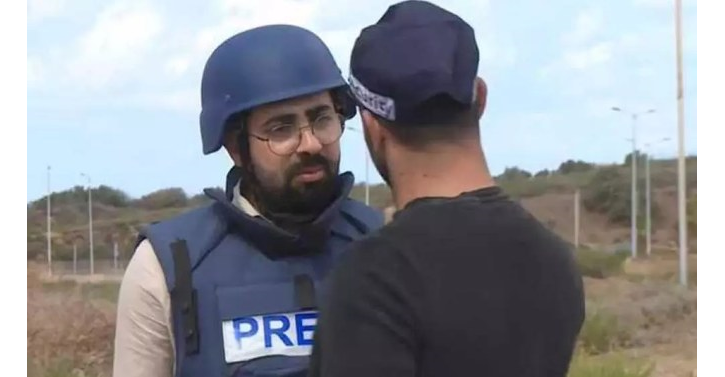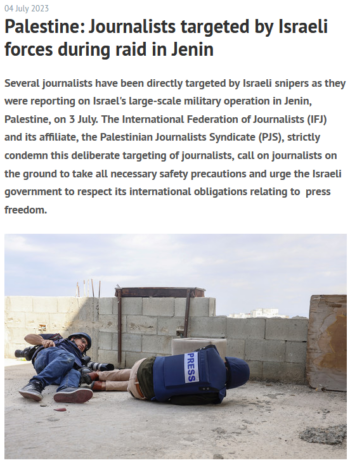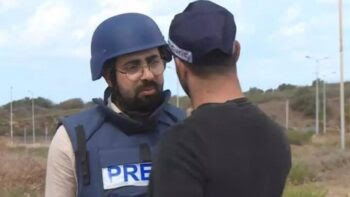Israeli Attacks on Journalists Stifle Reporting on Gaza HorrorsARI PAUL   CPJ (10/18/23) tallied 17 journalists killed in the first 11 days of the Gaza crisis—the same number as have been killed in Ukraine in the 20 months since the Russian invasion. The Israeli communications minister’s attempt to shut down Al Jazeera’s bureau in Jerusalem—on the grounds that the Qatari news outlet is biased in favor of Hamas and is actively endangering Israeli troops (Reuters, 10/15/23)—should inspire some déjà vu. In the last war in Gaza, an Israeli air strike destroyed a Gaza building housing both Al Jazeera and Associated Press offices (AP, 5/15/21). And just months ago, Al Jazeera (5/18/23) reported that “the family of Shireen Abu Akleh,” a Palestinian-American AJ journalist killed by Israeli fire while on assignment, “has rebuked Israel for saying it is ‘sorry’ for the Al Jazeera reporter’s death without providing accountability or even acknowledging that its forces killed her.” Since the launch of the network’s English service, Americans interested in Middle East news beyond what can be found in US broadcasting have often turned to Al Jazeera, and even more so as the BBC’s foreign service has declined (Guardian, 9/29/22). But the ability of Al Jazeera and other Arab reporters to cover the assault on Gaza is jeopardized by the alarming number of newspeople Israel has killed since the crisis began. The Committee to Protect Journalists (10/18/23) has counted 13 Palestinian journalists killed by Israel in Gaza since the crisis began, with two more missing or detained. Three Israeli journalists were also killed in Hamas's October 7 attack, with another taken prisoner.  A BBC News Arabic team "was stopped and assaulted last night by Israeli police," the BBC(10/15/23) reported. While the primary focus of this conflict is Gaza, journalists have wondered if a second northern front would open between Israel and the Lebanese Shia group Hezbollah, creating a multifaceted regional war (New York Times, 10/17/23; CNN, 10/17/23). Israeli fire in southern Lebanon injured Al Jazeera staffers, along with Agence France-Presse personnel, and killed a Reuters journalist (Reuters, 10/14/23). Lebanon has planned to file a complaint with the United Nations over the incident (TRT World, 10/14/23), calling the attack deliberate (Telegraph, 10/14/23). Press advocates fear those numbers will rise, and it is all happening as the humanitarian situation in Gaza worsens (UN News, 10/13/23). The BBC (10/15/23) reported that its own journalists “were assaulted and held at gunpoint after they were stopped by police in the Israeli city of Tel Aviv,” and that they were “dragged from the vehicle—marked ‘TV’ in red tape—searched and pushed against a wall.” In addition, the Palestinian Journalists Syndicate said in a statementthat the Israeli military caused “severe damage to 48 centers of press institutions,” including “the Palestine and Watan towers, and other buildings that include media institutions," including the AFP office. It said that the army had also “completely or partially demolished the homes of dozens of journalists.” 'Terror attack against democracy' "It is clear that there was a decision from occupying forces to prevent journalists from covering what was happening in the camp," reporter Ali Al-Samoudi said in July after Israeli snipers killed three newspeople and destroyed TV equipment on the West Bank (International Federation of Journalists, 7/4/23). War reporting always carries risk. The Committee to Protect Journalists has documented the deaths of media workers in the conflicts in Ukraine and Syria. Middle East conflicts have always been dangerous places for journalists; it’s hard to ignore high-profile deaths of journalists like Marie Colvin of London’s Sunday Times in Syria (CNN, 2/1/19), or freelance photographers Chris Hondros and Tim Hetherington in Libya (Washington Post, 4/21/11). In that sense, the war in Gaza and a possible war in southern Lebanon are no exceptions. But as FAIR (5/19/21) documented during the previous Israeli military operation against Gaza, Israel has a long history of targeting Palestinian journalists, as well as harassing foreign journalists and human rights activists entering the country. Over the summer, the International Federation of Journalists (7/4/23) reported that “several journalists have been directly targeted by Israeli snipers as they were reporting on Israel's large-scale military operation in Jenin.” Inside Israel, the situation for journalists is relatively safer, but the far-right government has—like authoritarian governments in Poland and Hungary—attacked journalists and the ability to critically cover institutions in power. Prime Minister Benjamin Netanyahu in 2019 accused the owners of Israel’s Channel 12 of committing a “terror attack against democracy” for reporting on the corruption charges against him (Times of Israel, 9/1/19). In 2020, Netanyahu (Ha’aretz, 6/11/20) indicated that “Channel 13journalist Raviv Drucker should be arrested and jailed" for airing “recordings of Netanyahu crony Shaul Elovich and his wife, which demonstrated how they sought to tilt news coverage in the prime minister’s favor.” Galit Distel-Atbaryan, who recently resigned from her role as public diplomacy minister (Jerusalem Post, 10/14/23), reportedly said this summer that she wanted the “authority to deny press credentials to foreign journalists critical of Israel” (Ha’aretz, 8/30/23). 'You better be saying good things' An Israeli security officer threatens an Al-Arabyreporter (Arab News, 10/15/23): "If you don’t report the truth, woe is you." The threat to journalism has only become more explicit as Israel's assault on Gaza escalates. An Israeli security officer interrupted a live report by Ahmed Darawsha, correspondent for Qatar-based Al-Arabynews (Arab News, 10/15/23): What are you saying? I don’t care if you are live.... You better be saying good things. Understood? And all of these Hamas should be slaughtered. Am I clear? If you don’t report the truth, woe is you.
The officer then shouted at the camera: “Detestable! We’ll turn Gaza to dust. Dust, dust, dust.” Israel’s siege of Gaza becomes more nightmarish as the days go on, and as that happens, the ability of journalists to document the horror becomes next to impossible. Palestinian journalist Sami Abu Salem told the International Federation of Journalists (10/12/23) about working in Gaza: “We have no internet service, there is a lack of electricity, no transportation, and even the streets are damaged. That's why we cannot tell lots of stories—thousands of stories.” Because audiences in the US and the Anglosphere depend on Al Jazeera, as well as local journalists in Israel and the Occupied Territories, to receive news from the region, these attacks do act as filters through which the truth is diluted. In many ways, Americans can see in real time how the powers that be attempt to control information coming out of the region. | 


1 opmerking:
Schokkend aantal , 17 dode journalisten in 11 dagen.
Een reactie posten